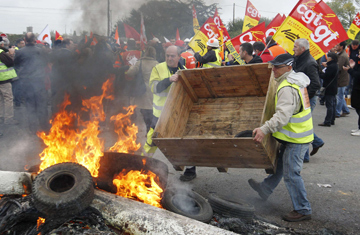
Workers of French oil giant Total and the SFDM Society, and SNCF railway workers set up a burning barricade to block the entrance of the deposit of the society SFDM near the oil refinery of Donges, near Nantes, October 15, 2010.
You have to give the French one thing: they know how to protest. As a week of demonstrations and strikes in France over looming pension reform came to an end Friday, it simply set up another one promising similar action as opposition to the conservative government of President Nicolas Sarkozy continues to spread.
The walk-outs and work stoppages by transport employees had slackened by Friday. But union bosses warned that renewed surges of hostility should be expected again next week, as battles continue to rage over Sarkozy's pledge to reform public pensions.
On Saturday, unions will hold their fifth nationwide march in as many weeks, hoping to mobilize the 3.1 million people they say participated in demonstrations Oct. 12. That day of strikes and protests caused considerable disturbances in air, rail and commuter train travel, as well as a slow-down of municipal transport like the Paris Métro — some of which continued to the end of the week. Along with Saturday's demonstrations, unions have scheduled the next day of strikes for Nov. 19 — a day that will also see nationwide marches if it goes ahead.
The strong industrial resistance to pension reform is the result of a gamble on the part of Sarkozy, who has refused to significantly amend his plans or negotiate with opponents. "The government is counting on this movement rotting or burning itself out, [but] I think we have the means of disappointing it," said Bernard Thibault, secretary general of the Confederation of French Labor union, on LCI television Friday morning. "This movement is well anchored in the country."
The reason for Thibault's confidence? Though striking oil workers lifted their blockade of two of France's 12 refineries early Friday, the chokehold they retain on the remainder risks provoking significant gas shortages in coming days. Meanwhile, unions representing truck drivers have called on their members to set up partial blocks on French freeways starting this weekend. Union officials hope the delays to motorists will lead citizens to direct their frustration at the government's intransigence, rather than protesters.
Such reverse psychology seems to be working. Perhaps the biggest protest concern the government now faces is the spreading participation of people seemingly least concerned by pension issues right now: High-school and college-aged students. At least 340 of the 4,300 lycées across France have been affected by daily student protests since Oct. 12, and complaints by conservative politicians that young people have no dog in the fight — and are simply being manipulated by unions and leftists — has only swollen their ranks. Worse still for Sarkozy's backers, clashes with police have left two student demonstrators seriously injured since Wednesday — further fueling what the front page daily Libération Friday called "The Youth Eruption."
Student protests have been central to regularly undermining controversial economic innovations by conservative and leftist governments in the past, especially when footage of police facing off with — or at times battling and arresting — young people has led shocked parents to side with their children's opposition. The last time that happened was in 2006, when violent demonstrations against a new youth employment status forced the conservative government of the time to repeal a measure it had already forced into law. "One shouldn't have mistaken pupils for children, [because] the heavy warnings by the government against any mobilization of students has had the opposite of the sought effect," writes Libération editor Laurent Joffrin Friday. "But it may also force the president to accept the principle of discussion, or concessions, which until now he's ruled out."
Known for his stubbornness when challenged, Sarkozy might well consider the reasons for compromising on the retirement reform he's staked his presidency on. Even opponents don't contest that France's swamped pay-as-you-go pension system needs tightening to halt a $13 billion annual deficit expected to surge to $123 billion by 2050. To do that, Sarkozy calls for raising the minimum retirement age from 60 to 62, and the age to qualify for a full pension from 65 to 67. Critics call that unfair, yet unlike in previous conflicts have called for modification of Sarkozy's proposal, not wholesale withdrawal.
Indeed, even detractors are short on other ideas to respond to the bulge of baby boomers heading into retirement, and leaving a smaller number of younger workers paying for their pensions. Bending to popular protest by negotiating on the fine print might cost Sarkozy a bit of his political pride, but it would quell the strike movement, ease reform through, and improve the chances of his increasingly unpopular presidency managing to win re-election in 2012.
